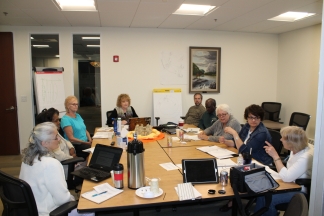news article
Bishop’s taskforce is called to eliminate racism
October 4, 2017 / By Stephen J. Hustedt
The 2016 Northeastern Jurisdiction overwhelmingly supported a Call to Action to end racism in a bold proclamation that it would work to end racism both in ourselves and in the world. However, the real work would begin when leaders returned to their individual Conferences. Many asked how to even begin working on such an enormous goal.
Bishop Mark J. Webb explained, “The NEJ Call to Action invites us first to the critical work of confronting our own racism. Each conference in the NEJ has been called upon to address the systemic and structural forms of racism in their conference and state and provide ways for the wounds of racism to be healed.”
To wrestle with the task, Bishop Webb named members to a taskforce. Known now as the Bishop’s Taskforce on Eliminating Racism, the group quickly started meeting and set about their enormous task, grounding their work in in their baptismal vows and the Social Principals of the United Methodist Church.
The members of the taskforce include: the Rev. Harold Wheat, Blenda Smith, Shafeegh Habeeb, Charles Syms, the Rev. Devin Lyles, Carrie Wolfe, Pam Burns, Barb Heise, Rachael Jordan, the Rev. Bill Mudge, the Rev. Vonda Fossitt, the Rev. Bill Gottschalk-Fielding, Bishop Webb, Scott Johnson, Leslie Haggstrom, and Sue Crawson-Brizzolara. The Rev. Teressa Silvers is the chair of the taskforce.
Because there is a great sense of urgency, the taskforce is meeting monthly.
“In light of the events of Charlottesville, and ongoing alarming incidents of racism across our nation, the work of the Call to Action Resolution is even more urgent,” said the Rev. Teressa M. Sivers. “The Bishop’s Taskforce on Eliminating Racism is working to create ongoing and sustainable ministries within the local churches across our Conference where we can engage in deep conversations on racism and increase ministries that impact racial justice. Together we will work to eliminate the evil of racism.”
“Racism is evil,” is a simple phrase the taskforce uses repeatedly to show there is no gray area biblically or in the United Methodist Social Principals. It is really that simple. However, how to address racism is incredibly complicated.
Genesee Valley District Superintendent, the Rev. Vonda Fossitt, pointed out that racism is systemic and often not obvious at first.
What is racism?
“(It) is when someone looks you up and down, 'sizing you up’ before looking into your eyes,” Rev. Fossitt said. “(It) is being underestimated based on the color of one's skin. (It) is being held to a certain standard without taking into account one's own personal context and individual challenges.”
The taskforce has many tasks they are working on for the fall and spring, including Conference-wide local conversations and large-scale events. However, the feeling is that the first task, and one of the largest tasks, is helping people to be willing to engage in the topic.
“Most of us say, ‘I'm not racist.’ As European Americans, we simply eliminate the issue of racism from our minds. What we don't see is institutional racism at educational, judicial, real estate, incarceration, banking, and corporate levels. Therefore we cannot acknowledge how painful racism is to or sisters and brothers of color.” Blenda E. Smith, chair of the Conference Commission on Religion and Race, said. “The Bishop's Taskforce on the Elimination of Racism is developing a process for local churches to be in conversations to understand racism and privilege within their own churches and local communities. This will also be an opportunity to see ways that various mission and outreach ministries are addressing racial justice.”
The conversations will be led locally, in settings where people are most comfortable, by well-trained leaders. Creating this process will take time, but the taskforce is not willing to wait until the local process is developed to start the conversation.
To that, the fall topic of the UNY Conference blog will be where we see and experience racism. The members of the taskforce will respond to a single question:
How has experiencing or witnessing racism impacted you, and how did you respond?
This conversation is not just for the taskforce. It is the whole Upper New York Conference. An open call to the Conference has been sent for blog responses. Moreover, comments for blog posts have been enabled to allow dialog. Comments will be monitored though an approval process to assure respectful dialog and adherence to Conference communications guidelines.
If you would like to respond to the blog question, send your response to news@unyumc.org. Blogs should be written in first person and no more than a few paragraphs long.
The hope is that the blog series will be the start of a conversation that continues on a local level.
While the taskforce acknowledges that these conversations will not be easy, they are not just important for improving our world, but also, they are important for our souls as United Methodist and Christians. Pretending like the problem of racism does not exist and staying silent is not an option.
To quote the Rev. Dr. Martin Luther King Jr., “Our lives begin to end the day we become silent about things that matter.”
This is as true for us as individuals as it is for the Upper New York Conference, the Northeastern Jurisdiction, and the United Methodist Church.